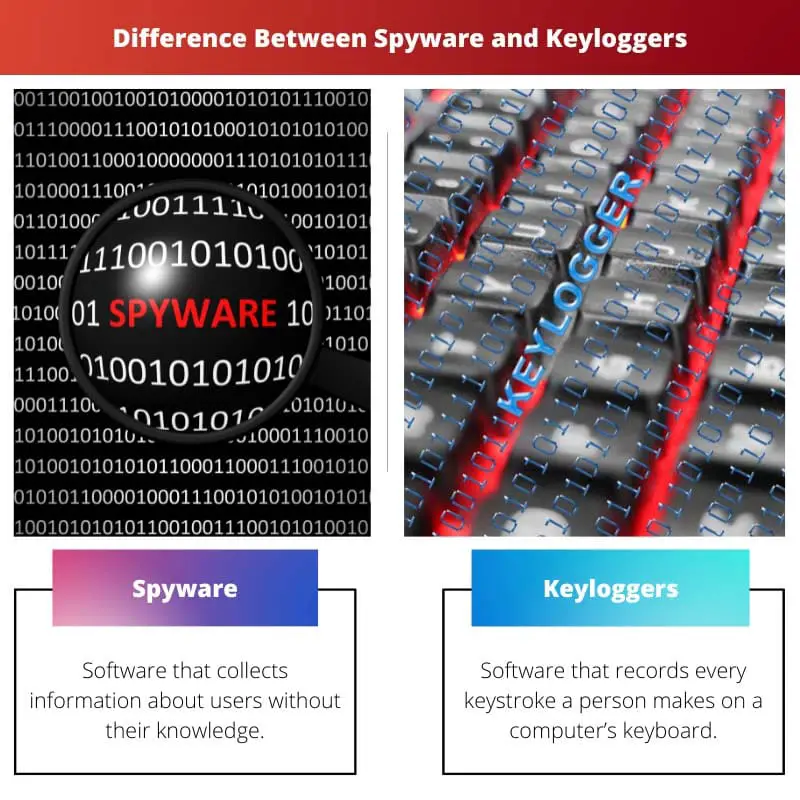Many harmful hacker programs can infiltrate your computer through the internet and steal your personal information by hampering your privacy and security.
A hacker could use this information to figure out your login and password details for a variety of websites even without viewing what is on the screen before the user.
Key Takeaways
- Spyware is malicious software that collects user data without consent, while keyloggers specifically record keystrokes.
- Keyloggers are a subset of spyware, focusing on capturing keyboard inputs.
- Spyware can collect various data types, including browsing history and personal information, while keyloggers focus on capturing typed information.
Spyware vs Keyloggers
Spyware is designed to monitor user activity and collect personal information, while keyloggers specifically target and record keystrokes entered on a keyboard. Spyware is installed without the user’s knowledge, while the device owner installs keyloggers for legitimate purposes.

Spywares are programs that gather small amounts of data concerning users without their permission. They’re designed to keep track of and log computer operations.
These are used to eavesdrop on someone, whether legally or illegally. Keyloggers are a kind of spyware, also called keystroke logging.
This sort of software records or logs the buttons that are pressed on a keyboard, invisibly so that the user who is using the keyboard is ignorant that their movements are being recorded.
Comparison Table
| Parameter of comparison | Spyware | Keyloggers |
|---|---|---|
| Meaning | Software that collects information about users without their knowledge. | Software that records every keystroke a person makes on a computer’s keyboard. |
| Records | User activity and internet browsing. | Users keystrokes. |
| Type | Type of malware | Type of spyware |
| Prevention software | Anti spyware | Anti keylogger |
| Examples | Internet Optimizer, BlazeFind, Gator | Magic lantern keylogger, Ardamax Keylogger, WinSpy |
What is Spyware?
Spyware is a sort of software that is placed on systems and secretly gathers details about people. Spyware is concealed from the user, as it is placed discreetly on the person’s private system.
Spyware, like keyloggers, is placed intentionally by the host of a communal, commercial, or public computer to discreetly watch other users.
Spyware is properly defined as software that silently watches the user. Such Spywares have capabilities and functionalities that go past mere surveillance.
These programs gather sensitive data about the target, such as their Internet usage routines and trends, as well as the pages they frequently visit.
By downloading another stealthy software on the customers’ computer system, the Spyware too can divert Internet browsing habits.
Spyware may even have the capacity to alter computer configurations, resulting in slower Internet data speeds and slower reaction times, which may lead to users whining to Web Service Operators about their Internet connection speed.
Allowing the downloading of an application when visiting a website can result in the installation of spyware. Since they send personal details over to the IP source, some programs resemble spyware.
These businesses seem to deliver the desired service to their customers in the hopes that the program will be valued more than security.
The Anti-Spyware program is accessible in the marketplace to combat the growth of Spywares, which have proven to be unpleasant for the average user.
Anti-Spyware software activation has become a regular procedure in today’s computer security measures.
What is a Keylogger?
The technique of recording the keys pressed on a keyboard, mostly in a clandestine way such that the individual using the keyboard is uninformed that such activities are being observed, is known as keystroke logging.
Anti-keylogger is a program that can identify and uninstall keyloggers that have been put on a computer system.
The use of a keystroke logger, known as a keylogger, is a faster and more convenient technique of obtaining passwords and observing the victims’ Computer savvy behavior.
There are two types of keyloggers: software and hardware. Software keyloggers are programs that are deployed on PCs and log each keystroke.
They are commonly positioned between the operating system and the keyboard device. Trojans or viruses place software keyloggers on a computing device without the individual’s consent.
Cyber attackers frequently download such programs on unsecured computer systems in common areas, allowing them to quickly collect the necessary details about the target.
Accessibility to the PC system is needed to deploy these keyloggers. Hardware keyloggers are tiny electronic devices that record keystrokes.
These are linked to a computer or a keyboard, and they record each keystroke in a document or the hardware memory. Such gadgets are installed on ATMs by cybercriminals to obtain ATM card PINs.
Main Differences Between Spyware and Keylogger
- Spyware is software that collects information about users without their knowledge while keylogger is a software that records every keystroke a person makes on a computer’s keyboard.
- Spyware records user activity and internet browsing while keyloggers record users’ keystrokes.
- Spyware is a type of malware while keyloggers are a type of spyware.
- Anti-spyware software can be used to prevent spyware while preventing keyloggers, anti-keylogger software can be used.
- Some examples of Spywares are Internet Optimizer, BlazeFind, and Gator while examples of keylogger are Magic lantern keylogger, Ardamax Keylogger, and WinSpy.

- https://ieeexplore.ieee.org/abstract/document/5471503/
- https://ieeexplore.ieee.org/abstract/document/8566151/
